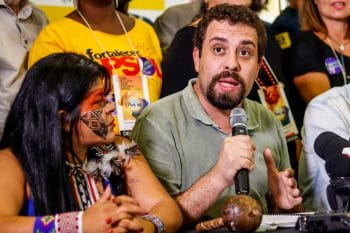Sunday, the 8th of July, was a turbulent day for Brazilian institutions. Federal Judge Rogerio Favreto unexpectedly ruled that the former president Lula should be immediately released. Interrupting his holidays in Portugal, Judge Sergio Moro, stepped in to keep Lula in prison, in an obvious overextension of his powers. A juridical impasse was created. The police did not know which order to follow. Immediately, an information war erupted in the social networks. Lula could be released at any moment, his supporters insisted. Finally, the high hopes faded by the end of the day, when the President of the Federal Regional Court of the South of Brazil decided that Lula should be kept in prison. The political-juridical circus can be analysed from many perspectives, and it is difficult to attribute blame at this stage. Nevertheless, the claim that Brazilian democratic institutions are working just fine, repeatedly made by Brazilian liberals, is becoming increasingly untenable.
The truth is that Brazil is heading towards elections with an elephant in the polling room. The May cover of Piaui, the country’s most respected cultural magazine, shows a line of embarrassed presidential candidates doing their best to ignore the bearded pachyderm looming behind them. The ironic reference to the former president Lula da Silva is transparent. Forcefully removed from the presidential race in what has been described by the philosopher Renato Lessa as a pre-emptive impeachment, Lula is still by far the most popular politician in contemporary Brazil. The last survey by Datafolha, an institute not particularly known for its sympathy for Lula and the Workers’ Party (PT) in general, shows that 30% of Brazilians would still vote for him in the first round, guaranteeing a decisive victory against a divided opposition. In the second round, the former president would easily beat any of the possible contenders.
The chances of Lula actually becoming president again are scarce at best, however. Being held captive in a 15 square metres cell in the southern city of Curitiba since April 7th, Lula’s candidacy seems more untenable every day, despite the insistence of the PT. While the other candidates are already campaigning, giving interviews and making rallies across Brazil and beyond, access to Lula is highly restricted. A group of 9 state governors, along with the 1980 Nobel Prize Laureate, Adolfo Perez Esquivel, was barred from visiting him. The corporate media is doing what they can to ignore the disturbing fact that the uncontested frontrunner in the upcoming elections is behind bars. The Brazilian right-wing is astonished. Despite the implacable criminalisation of politics and the juridical crusade against Lula, he is still politically alive. As Lula himself warned two years ago when he was held captive for a couple of hours in an orchestrated media show to damage his image: ‘If they tried to kill the snake, they hit the tail, not the head. The snake is alive, as it has always been.’
A split on the neo-developmentalist left
On the left, there is broad condemnation of the lawfare being waged against Lula and the evident fragility of the criminal evidence so far presented. Nevertheless, Lula’s imprisonment is prompting contradictory political reactions. Currently, it is possible to identify at least three different strategies within the Brazilian left. The Workers’ Party clings to Lula’s candidacy. Ciro Gomes, a moderate nationalist with real changes of winning in the absence of Lula, is actively trying to shift the debate and recompose the neo-developmentalist coalition that gave support to the Workers’ Party over the last twelve years. Finally, young leftist leaders such as Manuela D’Ávila and Guilherme Boulos are struggling to strike a balance between denouncing Lula’s arbitrary exclusion from the elections and, at the same time, running their own candidacies.
The PT’s strategy is coherent and principled. Seconded by some radical pro-Lula groups, such as the Labour Cause’s Party (PCO), and historical grassroots organisations, such as the Landless Workers’ Movement (MST), the Lulist hard-core denounces any elections without Lula as a continuation of the parliamentary coup that toppled President Dilma Rousseff in 2016. Forfeiting Lula’s candidacy would be equivalent to endorsing a fraud; it is Lula or nothing. Although the relations between Lula and his young successors in the left are cordial, their candidacies are not taken as serious alternatives. Ciro Gomes’ bid, on the other hand, is perceived as a real threat, and is being actively undermined by senior PT officials.
The problem with this strategy is that, notwithstanding the rightful indignation of the Workers’ Party, someone will be elected President of Brazil in the next few months. The ‘Lula or nothing’ strategy may leave an open avenue for the right to fill in the political vacuum. The worst-case scenario is the election of Jair Bolsonaro, an ultra-conservative former army captain recently converted to economic neoliberalism. Without Lula, Bolsonaro becomes the frontrunner. By stubbornly insisting on ‘Lula or nothing’, the left may get the second option. Ciro Gomes has repeatedly raised this point in his increasingly frequent media appearances. Branding himself as a centre-left candidate, and firmly holding the old banner of Brazil’s national development, he sensibly claims to represent the viable alternative, the only one with the capacity to prevent the electoral legitimation of the 2016 coup and its neoliberal agenda.
The new voices of the radical left

Manuela D’Ávila participates in presidential debates during the 22nd Conference of the National Union of Legislators (CNLE), in Gramado on May 10, 2018. Photo credit: Bruno Alencastro.
The crude pragmatism of Ciro Gomes’ candidacy contrasts with the renewed revolutionary enthusiasm of Manuela D’Ávila and Guilherme Boulos, both rising stars of the radical left. Despite being children of the Brazilian intellectual middle class, both young leaders bear solid popular credentials. Manuela started her political career as a students’ movement leader in the rows of the Communist Party of Brazil, a former Maoist party, converted to neo-developmentalism under Lula. Her discourse combines contemporary feminist elements with old nationalist and developmentalist exhortations, all wrapped in a defiant anti-imperialist tone. It represents the radicalisation of some of the progressive features of Lula’s administration, of which Manuela and her party were declared supporters.
The most auspicious institutional innovation in Brazilian left politics since the formation of the PT is the consolidation of the Socialism and Liberty Party (PSOL). Originally a small dissident group formed by a handful of Congress Members that refused to vote for a set of pro-market reforms endorsed by Lula in 2004, the party grew and renewed itself. It came to represent a wide range of social movements and political tendencies dissatisfied with the inherent limitations of the PT’s neo-developmentalist agenda. Despite having a small representation in the National Congress, the PSOL came close to power in the 2016 local elections in Rio de Janeiro, where Marcelo Freixo finished second, winning more than a million votes.

Guilherme Boulos at the electoral conference of the Socialism and Freedom Party (PSOL) on March 10, 2018. Photo credit: PSOL 50.
Guilherme Boulos, PSOL’s 2018 presidential candidate, is quickly becoming the public face of the new radical left. At 35 years old, the well-educated teacher and Lacanian psychanalyst is increasingly perceived as Lula’s true political heir, a dubious honour refused by Boulos himself, inasmuch as ‘only the dead have heirs’. There is indeed some superficial likeness between Boulos’ bearded figure talking to the masses and the first appearances of Lula as the leader of the historical blue colour strikes in the 1980s. Boulos’ discourse, however, goes far beyond anything Lula has ever been able to say.
Lula has always been a master of class conciliation. Boulos, on the other hand, is running on bold socialist rhetoric, which explicitly recognises conflicting class interests. ‘The role of my campaign is not to calm down the markets,’ he said in an interview to the BBC. ‘The market might as well get some Rivotrill.’ What is more, backed by grassroots social movements, and having as his ticket partner a young indigenous leader, Sonia Guajajara, Boulos is clearly proposing a post-developmentalist agenda. The traditional banner of ‘national development’ is subordinated to the endeavour of overcoming social inequality and radically transforming the extractivist and super-exploitative character of Brazilian peripheral capitalism.
Important as their candidacies are, the incarceration of Lula and his forceful exclusion from the upcoming elections puts both Boulos and Manuela in a difficult position. When the arrest of Lula was declared, Boulos and Manuela could be seen alongside him in a last emotional rally at Lula’s political cradle, the Trade Union of Metal Workers, at Sao Bernando do Campo, SP. In interview after interview, both are repeating that Lula must be released and allowed to run. By doing so, however, they are tacitly admitting that they are participating in a rigged electoral process. At the same time, instead of running to denounce the electoral farce, both are seriously presenting their candidacies as if they had a real chance of winning. Furthermore, the personal defence of Lula makes it more difficult to distance oneself from his problematic neo-developmentalist legacy, a discursive conundrum particularly relevant for Boulos. When Lula himself recorded a short video wishing Boulos good luck in his electoral bid, part of the PSOL made public their dissatisfaction.
What is to be done?
Two years after the overthrow of Dilma Rousseff and the ousting of PT from office, the scenario is not as grim for the Brazilian left as it once looked. The range of possibilities is broad, both in the short and the long run. The neo-developmentalist left has the frontrunner in the upcoming election (Lula) and a strong substitute in case Lula is indeed barred from running (Ciro Gomes). Promising young radical leaders (Manuela and Boulos) are rising, pointing to a post-development horizon. Tragically, nevertheless, despite its varied possibilities, the left may end up defeated in the upcoming elections. The symbolic weight of that defeat would be mammoth, since there is a strong plebiscitary element in the 2018 elections. The victory of candidates that supported President Rousseff’s impeachment in 2016 would represent an a posteriori validation of what the left has been repeatedly calling a parliamentary coup.
The obvious answer, the constitution of a broad left-wing front in the upcoming elections, is not only unlikely, but may also be counterproductive. Of course, there are laudable attempts at building bridges between Lula, Ciro, Manuela and Boulos. During the World Social Forum 2018 in Salvador, the Brazilian left parties launched a common manifesto called ‘Unity to rebuild Brazil’. However, as the text makes clear, the hegemonic force behind this effort is the old, developmentalist left. Candidates such as Boulos and, to a lesser extent, Manuela, represent an important reinvigoration of the Brazilian left, and should not be subordinated to the neo-developmentalist project represented by Lula and Ciro Gomes. In other words, the urgent task of defeating the right in the upcoming elections cannot come at the price of compromising the future. If the new radical left fails to put forward a clear critique of Lula’s legacy and propose an anti-capitalist alternative, the dissatisfaction with the intrinsic limits of neo-developmentalism will be easily captured by new voices on the right.
At 72 years old, Lula is still the central figure of Brazilian party politics. His incarceration keeps the whole left in captivity. Constrained by the circumstances to defend Lula’s right to run, the potential of Boulos and Manuela to inspire true political renewal is compromised. At the same time, the shadow of Lula makes impossible the consolidation of any other competitive candidacy on the left. Lula could potentially break the impasse by giving up his electoral pretentions and indicating a substitute within the PT, or officially endorsing Ciro Gomes. Unfortunately, this may be too much to ask from a man unfairly kept behind bars, and undemocratically removed from the political game. At this critical juncture, there are no easy answers. With three months to the elections—an eternity in political terms—the political landscape may change quickly and in unexpected ways. These convoluted times can still bring about the return of the left to power and the beginning of its long-awaited rejuvenation. For that to happen, the Brazilian left must learn to reconcile long and short-term objectives, and not lose sight of its real enemies.

